China is a major producer of unique and inexpensive goods. By finding the best items to import from China and sell, Chinese merchandise can be used to drive profitability and growth by yielding high margins.
We identified the 22 most profitable items to import from China (based on profit margin, demand, and other factors) and put together a guide to help you get your import business started.
- High profit margins: Our list focuses on the most profitable goods—so we compared the wholesale cost of each item (as purchased in a 100-unit order from a reputable supplier on Alibaba) with the average retail price of the exact same product. We then prioritized merchandise with the highest margins.
- Sufficient demand: We used keyword data from Amazon and Google to identify items that have historically consistent demand and high search volume in recent months—indicating that they are likely to perform well.
- Low risk for consumer issues: We evaluated the possibility for consumer problems that could result in returns, warranty cases, or liability issues—such as risk of misuse, injury, or malfunction. The items featured on our list carry a low risk for these complications.
- Easy to ship: Our list focuses on items that are simple and cost-effective to transport and fulfill. This considers size, weight, construction, and maintenance requirements (like the need for climate control).
- Legal to import and sell: While we recommend checking your local government regulations, the items on our list aren’t prohibited for import or sale in the United States.
As you read through the list, keep in mind the potential profits and margins listed don’t account for your store’s overhead costs or the expenses involved in importing products (such as shipping costs, customs fees, insurance, and duties—which are often called landed costs).
These expenses typically take a sizable bite out of your bottom line, so be sure to consider them when estimating the profitability of a product or venture.
1. Hydrocolloid Patches
Search Volume (monthly average by keyword):
|
 (Source: Alibaba) |
Hydrocolloid patches are used for treating pimples and blemishes. They’re typically made of benign, gel-forming agents such as pectin or gelatin that absorb excess fluids, so the risk of consumer misuse or allergic reactions is low.
Plus, thanks to their simple and lightweight composition, hydrocolloid patches are one of the most profitable items to import from China, available for just pennies per pack.
Learn everything you need to know to import products from China with our guide.
2. Stickers
Search Volume (monthly average by keyword):
|
 (Source: Amazon) |
Stickers are an excellent item to import from China for resale, thanks to their small size, flat shape, and popularity among kids of all ages. They come in an array of designs, from popular cartoons to inspirational quotes, making them versatile for different target markets. Stickers are often used for personalizing laptops, water bottles, and notebooks, extending their appeal beyond just children.
Thanks to their simple materials and inexpensive production costs, bulk stickers are available for extremely low prices on Alibaba, and sell in packs of 100-300 while still earning a high profit margin.
3. Nano tape
Search Volume (monthly average by keyword):
|
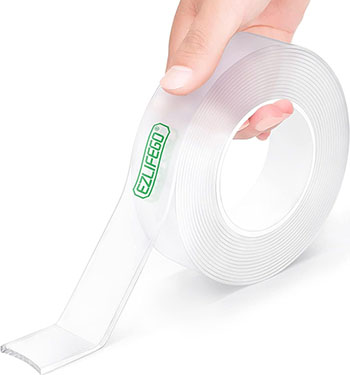 (Source: Amazon) |
Nano tape is a rising star in online shopping, and it’s currently the most popular form of double-sided tape. Known for its strong grip and reusability, nano tape is a go-to for hanging posters without damaging walls and has other uses in home repair. Kids love it too, as it can be used to create bubble toys. Given its diverse appeal, durability, and low shipping costs, it’s one of the best products to import from China.
4. Microfiber Cloths
Search Volume (monthly average by keyword):
|
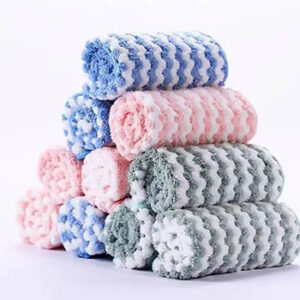 (Source: Alibaba) |
Microfiber cloths are versatile cleaners that appeal to a variety of customers and use cases—like automotive care, household chores, and skincare.
When importing, focus on high GSM counts for better quality and consider various weaves, like waffle or terry, for specialized cleaning tasks. You can also offer multi-color packs or eco-friendly options for market appeal.
The lightweight and compact nature of microfiber cloths makes them cost-effective to ship in bulk, offering another layer of profitability to your business.
5. Facial Roller Tools
Search Volume (monthly average by keyword):
|
 (Source: Alibaba) |
Facial rollers and gua sha tools currently rank as one of the top items in the Beauty & Personal Care category on Amazon’s Best Sellers list. They’re used to soothe the skin and prevent aging, and are typically sold as a two-piece set.
“Semi-precious” gemstones (such as jade and, to a lesser extent, rose quartz) are the material of choice for these rollers. They retain temperature better than other substances and provide an attractive aesthetic.
The jade used for these rollers is typically much lower in quality than jewelry-grade material, which allows it to be manufactured and imported at a highly affordable price. At the same time, natural gemstone materials fetch sizable retail markups despite color imperfections—making facial rollers a profitable product to stock.
6. Garlic Presses
Search Volume (monthly average by keyword):
|
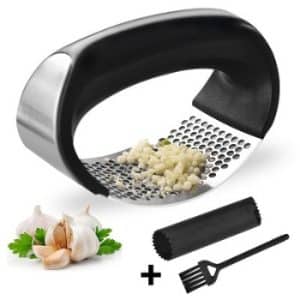 (Source: Alibaba) |
Garlic presses are small, manageable goods that are in high demand due to their effectiveness in the kitchen. These tools are available in numerous variations and can be sold with complementary accessories (as shown in the photo above). This provides ways to stay competitive in the wide pool of garlic presses currently on the market.
7. Portable Phone Chargers
Search Volume (monthly average by keyword):
|
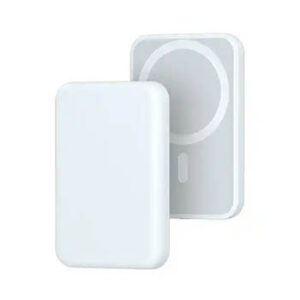 (Source: Alibaba) |
Portable phone chargers are always in high demand. They’re also small and relatively lightweight, so shipping is a breeze. You can choose from a variety of power bricks, from the most basic USB-connected option to magnetic chargers or solar-powered battery packs.
8. Cellphone Car Mounts
Search Volume (monthly average by keyword):
|
 (Source: Alibaba) |
Phone mounts for cars come in a wide variety of styles—giving you a better chance of attracting buyers despite the thick competition. That said, magnetic car mounts tend to be the most popular.
The retail price can vary depending on features like stabilization and charging capabilities, but nearly all products in this arena are small, easy to ship, and evergreen.
9. Wireless Phone Chargers
Search Volume (monthly average by keyword):
|
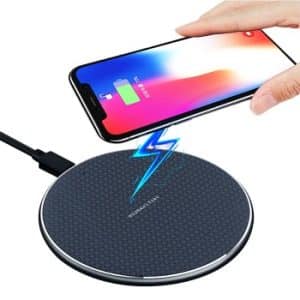 (Source: Alibaba) |
Wireless charging is now a commonplace feature in modern smartphones, so the market for wireless chargers is thriving. These devices come in varying levels of wattage (typically 7.5W, 10W, or 15W) that correlate to the speed at which they can charge a device—but most phones can only handle 7.5 to 9 watts.
When seeking wireless chargers from various product sources to import, your best bet is to go with a product listed as having “Qi” functionality. This refers to a standard construction of wireless technology. Qi chargers are compatible with Qi phones, and the vast majority of modern smartphone batteries charge through Qi.
10. Wi-Fi Extenders
Search Volume (monthly average by keyword):
|
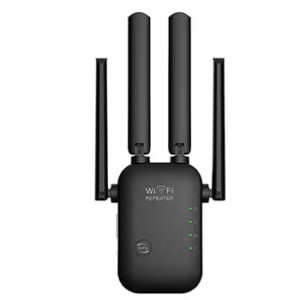 (Source: Alibaba) |
These devices connect to the consumer’s Wi-Fi network, then duplicate and rebroadcast it to extend its range. In the age of streaming and remote work, Wi-Fi extenders are more popular now than ever.
They garner hundreds of thousands of search queries every month under the terms “Wi-Fi extender,” “Wi-Fi repeater,” and “Wi-Fi booster.” Effectiveness and selling price depend on Mbps transmission rate and antennae type/range.
11. LED Lights Strips
Search Volume (monthly average by keyword):
|
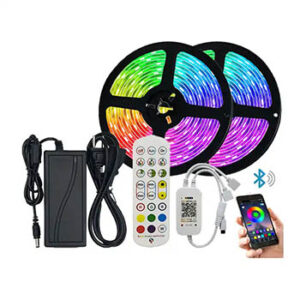 (Source: Alibaba) |
LED light strips are a fun way to add some light to an area without an outlet or running up the electric bill, and they’re highly popular among online shoppers. Like many other products on this list, they’re lightweight, small, and easy to ship. Plus, there are many options—remote-controlled, colorful, solar-powered, timer, etc.—so you have no shortage of choices.
12. Selfie Sticks
Search Volume (monthly average by keyword):
|
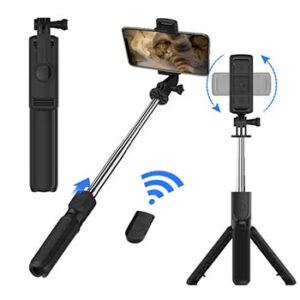 (Source: Amazon) |
Selfie sticks are a popular accessory for capturing photos, and have stayed in high demand thanks to the ubiquity of smartphones and the rise of social media. They come in various styles, from basic extendable rods to more advanced models with Bluetooth controls and stabilization features.
When importing this product from China, look for features that will stand out in the market, such as integrated tripods or remote shutter buttons. Premium models with added functionalities can sell at higher retail prices.
13. Memory Foam Pillows
Search Volume (monthly average by keyword):
|
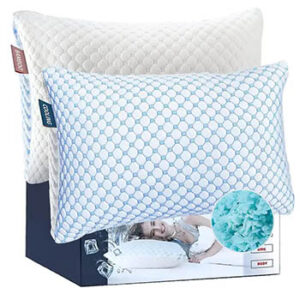 (Source: Alibaba) |
Foam pillows appear bulky but can usually be compressed greatly—allowing for much easier shipping from China. Certain materials (such as bamboo or ventilated gel) can drive up the selling price of a pillow, as well as specialized shapes (like anti-apnea or cervical support). Consider your target market when sourcing memory foam pillows.
14. Backpacks
Search Volume (monthly average by keyword):
|
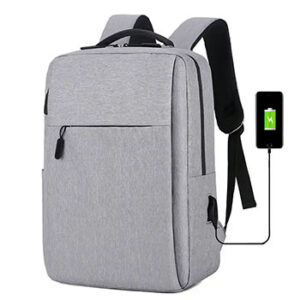 (Source: Alibaba) |
Backpacks are versatile, profitable, and can be easy to fit into any niche. While the simple keyword “backpack” yields hundreds of thousands of searches every month, more refined keywords such as “school backpacks,” “backpacks for girls,” “backpacks for boys,” and “laptop backpacks” are highly popular as well.
When choosing backpacks to import, consider which features your target consumer would want—such as USB charging ports, anti-theft compartments, or school supplies organization.
15. Silk Pillowcases
Search Volume (monthly average by keyword):
|
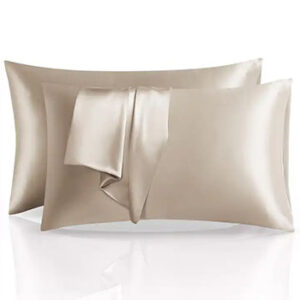 (Source: Amazon) |
Silk pillowcases are increasingly sought-after for their luxury feel and beauty benefits, such as reduced hair frizz and smoother skin. Made from natural silk fibers, these pillowcases are not only soft but also breathable, as well as extremely compact for affordable shipping. They’re popular among beauty enthusiasts, those with sensitive skin, and home decor enthusiasts.
Variants with added features, like hypoallergenic properties, can command higher retail prices.
16. Water Shoes
Search Volume (monthly average by keyword):
|
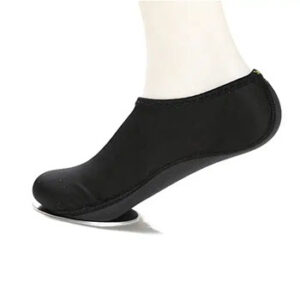 (Source: Alibaba) |
Water shoes are designed to be sleek, lightweight, and durable—which lends to their fit as a great product to import from China. They have a variety of outdoor and fitness applications, such as swimming, surfing, wakeboarding, fishing, and even car washing.
17. Cosmetic Brush Sets
Search Volume (monthly average by keyword):
|
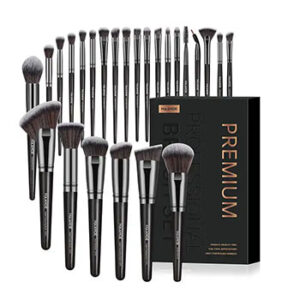 (Source: Alibaba) |
Makeup brush sets usually include 10–30 different types of brushes, with each one designed for a specific application. It’s standard for the bristles to be made of synthetic material, but the softness depends on the manufacturer—so be sure to order samples.
When selling cosmetic brushes, you can differentiate your offerings by sourcing brushes with unique handles or an attractive carrying case. Price and cost will vary depending on materials and number of brushes included.
18. Lighted (LED) Mirrors
Search Volume (monthly average by keyword):
|
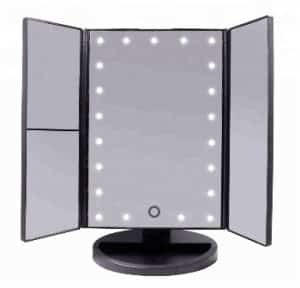 (Source: Alibaba) |
Stylish, lighted mirrors are very popular holiday gifts but also sell consistently throughout the rest of the year. They appeal to female audiences and fit nicely into many beauty and personal care niches.
These mirrors are available in a variety of forms—including large, wall-mounted options and those with protruding LED bulbs. For shipping and import purposes, it’s best to start with small, tabletop models that have recessed LED lights.
19. Vegetable Choppers
Search Volume (monthly average by keyword):
|
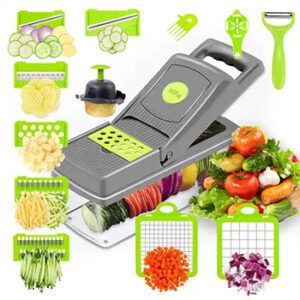 (Source: Alibaba) |
Vegetable choppers streamline food preparation, offering quick and precise cutting options for vegetables, fruits, eggs, meats, and other ingredients. These kitchen gadgets typically come in manual variants, although electric models are available.
The highest retail prices are seen on choppers that feature different blade types and functions for dicing, slicing, and chopping, as well as bonus kitchen tools like spiralizers and peelers.
20. Food Scale
Search Volume (monthly average by keyword):
|
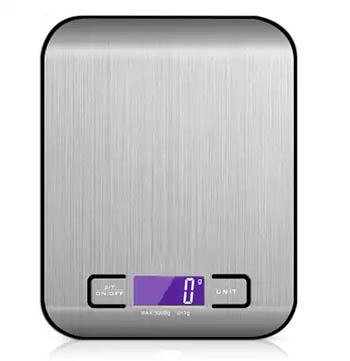 (Source: Alibaba) |
Kitchen scales are compact products that have gained popularity recently thanks to the rise of online cooking videos. Available in digital, mechanical, and smart variants, these scales offer features like tare function and unit conversion. Upgraded models with nutritional data or Bluetooth can fetch higher prices.
21. Nail Polish
Search Volume (monthly average by keyword):
|
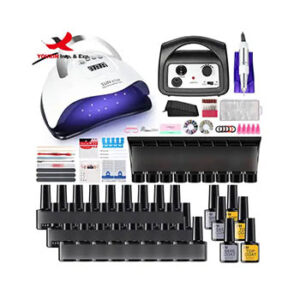 (Source: Alibaba) |
Nail polish can be sold individually or in sets of multiple colors. It should also be noted that there are a few different types of nail polish that you can sell—including regular polish, gel polish (which is cured under a UV or LED lamp), and “dip” polish (which is used as a powder that reacts to a liquid activator).
The details of your nail polish offerings will depend on your target consumer, but you can also choose to sell kits that include manicure implements like a UV lamp and a set of tools (as shown above). Nail polish is often sold as a private label item—so you work with the supplier to apply your own branding before the items are shipped.
22. Binoculars
Search Volume (monthly average by keyword):
|
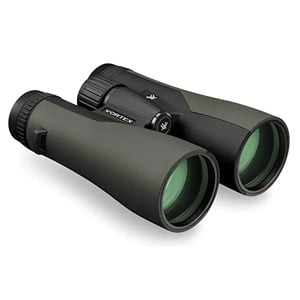 (Source: Amazon) |
Binoculars cater to a wide range of people and interests. They’re versatile enough for children’s play, nighttime exploration, or bird-watching in wet conditions.
These products require a greater investment but churn out high profits at a healthy margin, making them a good choice if there’s room in your retail business’ budget. Plus, they’re compact, so you can find affordable shipping options.
We sourced the wholesale price for each of these items from reliably rated suppliers on Alibaba, the world’s largest B2B marketplace, with millions of available products from China (as well as other parts of the world).
Alibaba has secure payment processing options, purchase insurance that includes quality guarantees, and even logistics services—making it a good place to find the most profitable products to import from China for beginners.
Tips for Finding the Most Profitable Items to Import From China
There’s no denying the lucrative potential of finding the best items to import from China. However, this trade is not an easy task—especially for beginners. There are a number of rules and procedures to follow that can create costly delays if overlooked, so reduce the learning curve and avoid common mistakes by following this helpful guide.
1. Do Your Research
Research is perhaps the most important part of starting an import business. If this is your first time as an importer, it’s crucial to learn about your target customer, the customs processes in your country, and Chinese business culture.
Consider these details when researching:
- Geography: Knowing the layout of China’s manufacturing and exporting infrastructure will help you identify the best places to source your products based on manufacturer locations and shipping options. Use our map below for reference.
- Product restrictions: Some products require permits or licenses to import, whereas others have restrictions that importers must adhere to. Check your local government agencies’ websites to see the requirements for each item before placing a wholesale order.
- Chinese business culture: Conducting business in China is likely very different from what you’re used to. Learn how to communicate effectively and build business relationships with Chinese suppliers for a strong and profitable supply chain.
- Customs clearance: It’s important to know what is required for your shipment to pass through customs—including duty/taxes, inspections, and documentation.
2. Find a Product in High Demand
The key to a successful import business is finding the right product to sell. You can start with low-risk goods such as toys or clothing; these types of products will be successful in almost any market, so you can’t fail easily. But keep in mind they often require additional certifications and/or screening at customs.
Once you get comfortable doing this type of business, you can always expand to electronics or other types of goods. Here are the most popular and the best products to import from China:
- Apparel
- Electronics
- Plastics and articles made of plastics
- Accessories
- Small kitchen appliances
These products and their parts are often mass-produced, which helps to bring the cost down when sold wholesale.
3. Select a Supplier
Finding a reliable wholesale supplier becomes harder when you are importing goods from halfway around the world. It’s crucial that you understand their supply chain process to identify the type of supplier that will work best for you. Once you do, look for options and take time to learn about how they operate their business.
There are three different kinds of suppliers you can find in China:
- Factory supplier: One who owns its facility and produces specific products that are of export quality. These trade partners usually offer the lowest price but the highest minimum order quantity (MOQ).
- Trading company: One who sources multiple products from factory suppliers through established relationships, which typically earns them low prices. These trade partners usually have a wide variety of products and lower MOQs, but higher prices.
- Intermediary: One who is a local representative in China hired for the task of dealing and shopping on your behalf.
Here are some useful guidelines for choosing a supplier:
- Source suppliers from online portals like Alibaba and vendor directories such as GlobalSources.
- Look for suppliers with established trade history and positive reviews, if possible.
- Find a supplier that can offer to start with a low MOQ.
- Request samples or place a small trial order.
- Work with suppliers who agree to a secure payment arrangement, such as Alibaba Trade Assurance, PayPal, and LC.
- Call the supplier over the phone or a video call, if possible, to ensure you have the right contact details
4. Test for Quality
Quality issues are among the most common hurdles retail importers face. It’s crucial to set up a process to test your goods to avoid returns and lost investments on unsellable merchandise—especially if you’re starting a new business.
Here are some guidelines to follow:
- Specify that samples should be made from the exact batch of materials in your product run. This is to ensure that you know what to expect and identify measurable features to compare against the actual products to be sold.
- Hire a local third-party inspection company that you can trust. They will serve as your consultant and advise you of your rights and options as an importer. This is a good investment—especially for beginners who have not yet established close, professional ties in China.
- Be very detailed in the description of your product and make sure to agree upon a Product Specification Checklist with your supplier.
- Don’t drive a hard bargain. Remember that every time suppliers agree to lower their prices, there’s a good chance that this will affect product quality.
You can also refer to feedback from the supplier’s other clients. Maintaining a standard of quality in your products will benefit your brand, so don’t let the distance make you compromise as there are steps available for you.
5. Decide on a Shipment Method
When importing from China, your main shipping options are:
- Express couriers like UPS and DHL, which can deliver your shipment anywhere from two to five business days via air. These companies often include customs clearance services—but the total cost is high.
- Air freight, which usually takes two to 11 days and costs roughly $5 to $7 per kg.
- Sea freight, which can take 12 to 50 days but is the best way to import large shipments. This option is the least expensive (typically costing $1 or less per kg).
While waiting, make sure to check your commercial invoice, packing list, bill of lading, and other related freight documents. Couriers will usually have a website where you can track your shipment or a customer service number to call. You can also ask your supplier the best option, as they have most likely developed an efficient process for shipping their products.
6. Follow Regulations
In the United States, it’s your responsibility as a business owner to ensure that your merchandise complies with regulations and restrictions imposed by the Bureau of Customs and Border Protection (CBP) and partner government agencies (PGAs), such as the FDA and the USDA.
Importers based in the US must keep track of federal regulations―applicable in all US states―and state regulations, which are requirements specific to each state. The guidelines they provide include everything from shipping to labeling of products depending on the type.
For example, children’s products, apparel, and packaging will need to have warning labels, and every single product will have to indicate the country of origin.
See the CBP’s Guide for Commercial Importers for full information.
Remember that all import-export processes require certain documents to be provided by the importer and the exporter. Certificates regarding the origin of the goods will also be part of the paperwork in many cases.
Bottom Line
Finding the best products to import from China is a powerful way to increase the profitability of your retail business. The success of your trade comes down to selecting the right products to sell, and these items are low-risk, high-margin offerings.
Remember to account for overhead expenses and the landed costs of each product. Maintaining success requires keeping up on the most profitable items to import from China, as well as close attention to the import process, quality control, and your fulfillment strategy.
